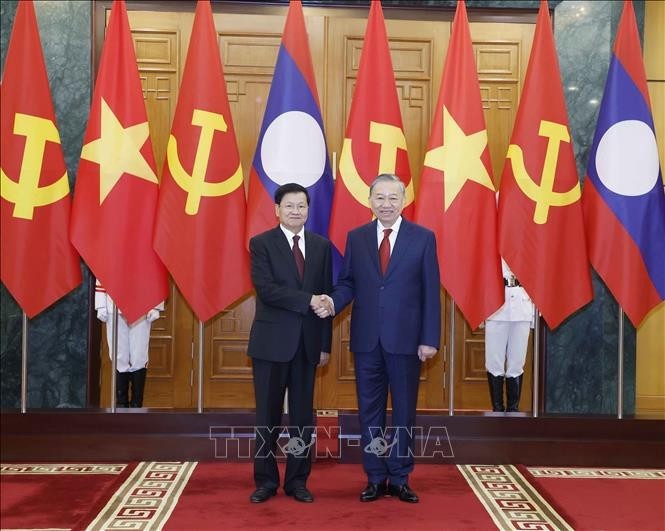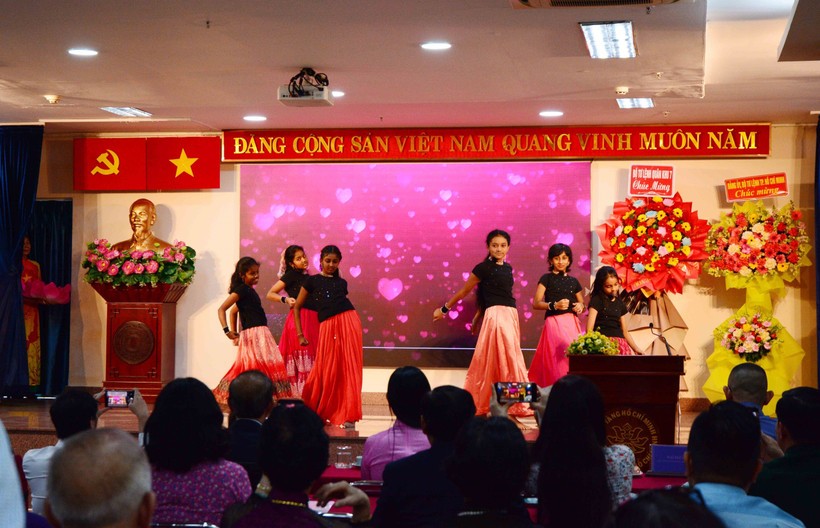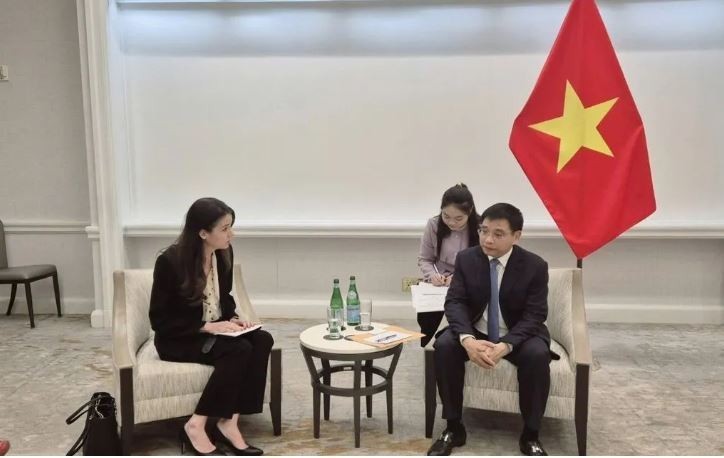Vietnam News Today (Apr. 12): EuroCham's 2025 Whitebook Suggests Policy Priorities for Vietnamese Resilience
| Vietnam News Today (Apr. 10): Vietnam Affirms Positive Role and Responsibility at UNESCO | |
| Vietnam News Today (Apr. 11): Vietnamese and New Zealand PMs Vow Stronger Ties, Regional Coordination |
| Vietnam News Today (Apr. 12) notable headlines China vows stronger ties with Vietnam ahead of top leader's state visit EuroCham's 2025 Whitebook suggests policy priorities for Vietnamese resilience Australian scholar praises Vietnam’s remarkable 50-year transformation Vietnam to showcase food, tourism, and craft products in Europe Fireworks to light up Ho Chi Minh City skies on April 30 Xi Jinping’s Vietnam visit is to further enhance strategic trust, says spokesperson ITE HCMC 2025 expected to host over 12,500 B2B arrangements Xi Jinping’s coming Vietnam visit holds significant importance, says ambassador Ho Chi Minh City gears up for 2025 UN Day of Vesak hosting |
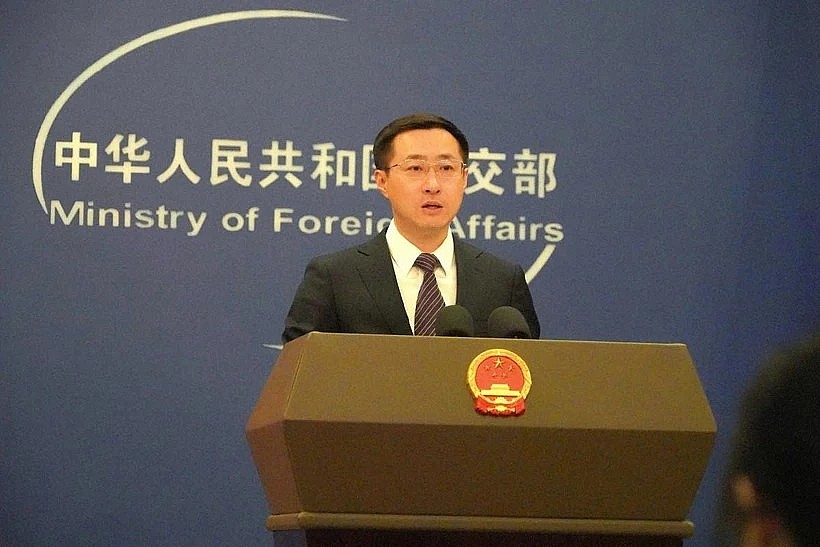 |
| Chinese Foreign Ministry spokesperson Lin Jian (Photo: VOV) |
China vows stronger ties with Vietnam ahead of top leader's state visit
The upcoming state visit of China's top leader Xi Jinping to Vietnam is expected to be an opportunity to consolidate the traditional China–Vietnam friendship, described as comrades-plus-brothers; enhance mutual strategic trust, deepen substantive cooperation, and advance the practical development of the China–Vietnam community with a shared future, said a Chinese diplomat.
General Secretary of the Communist Party of China (CPC) Central Committee and President of China Xi's April 14 -15 visit is made at the invitations of General Secretary of the Communist Party of Vietnam (CPV) Central Committee To Lam and State President Luong Cuong.
At the regular press briefing on April 11, Chinese Foreign Ministry spokesperson Lin Jian said China and Vietnam are friendly socialist neighbours, both undertaking reforms in line with their national conditions. Strengthening unity and collaboration serves the common interests of the two nations.
He highlighted that Xi’s historic visit to Vietnam at the end of 2023 ushered in a new chapter for the China–Vietnam community with a shared future, cited VNA.
Over the past time, the Chinese leader has maintained strategic communication with CPV General Secretary To Lam, while ministries, agencies, and localities of both countries have engaged in close exchanges. Cooperation in various fields has yielded encouraging results, delivering tangible benefits to the two countries' people.
Lin underscored the special significance of the upcoming visit, saying it coincides with the 75th anniversary of diplomatic relations between the two countries. During the visit, the Chinese leader will hold talks with Party General Secretary To Lam and meet with President Luong Cuong, Prime Minister Pham Minh Chinh, and National Assembly Chairman Tran Thanh Man.
At the briefing, Lin also revealed that alongside Vietnam, Xi will also visit two other Southeast Asian countries, namely Malaysia and Cambodia.
He reiterated that neighboring countries remain a priority in China's foreign policy, and that China and Southeast Asia are good neighbours, good friends, and good partners. This Southeast Asia tour, President Xi’s first overseas trip of the year, holds major significance for fostering the comprehensive development of China’s relations with Vietnam, Malaysia, and Cambodia, as well as with ASEAN as a whole. It is expected to inject fresh momentum into the peaceful development of the region and the world.
EuroCham's 2025 Whitebook suggests policy priorities for Vietnamese resilience
Despite global challenges, Vietnam is maintaining its ambitious 8% GDP growth target for the year, and achieving this goal will require the country to strengthen its internal capabilities and fully leverage its external partnerships, said Bruno Jaspaert, chairman of the European Chamber of Commerce in Vietnam (EuroCham).
“In this moment of global flux, Vietnam’s ‘bamboo diplomacy’ must be grounded in long-term and balanced economic alliances,” Jaspaert said at the Whitebook Launch 2025 in Hanoi on April 11.
“The European business community, represented here with EuroCham, is a stable, values-driven partner – here for the long haul. Our Whitebook reflects this partnership, offering pragmatic solutions drawn directly from the business frontline,” he noted.
Insiders point out that the 2025 Whitebook comes at a pivotal moment amid newly imposed tariffs and heightened geopolitical volatility which are posing challenges for Vietnam’s export-driven economy. While most firms have yet to alter their investment strategies, there is a strong and urgent demand for decisive reforms in order to preserve confidence and to sharpen the country’s competitive edge.
In this context, the 2025 Whitebook urges policymakers to fast-track critical reforms and to capitalize on Vietnam’s strategic position as a gateway for the EU to ASEAN.
In particular, the Whitebook presents a cross-sectoral framework centred around five Must-Win Battles, including entry visa policy, immigration and airport infrastructure, work permits, VAT refunds, and customs procedures for the first time.
These core issues are widely recognised as being fundamental to ease conducting business, thereby significantly reducing administrative barriers, boosting investor confidence, and improving Vietnam’s long-term economic performance.
For his part, EU Ambassador to Vietnam Julien Guerrier reaffirmed Europe’s long-standing commitment to open and fair trade, according to VOV.
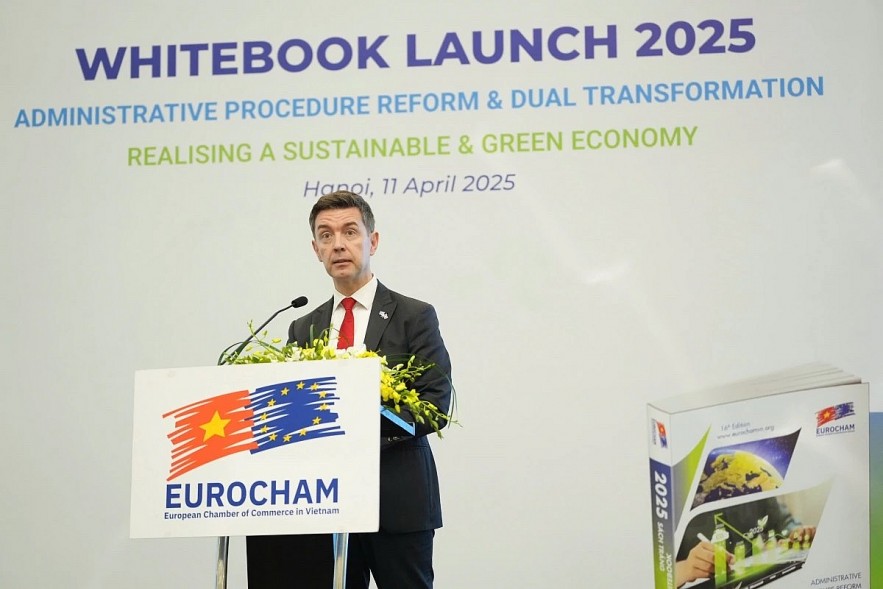 |
| EU Ambassador to Vietnam Julien Guerrier speaks at the event. |
“Free and fair trade is in Europe’s DNA and is the backbone of our prosperity and competitiveness. The EU is determined to work with partners, and with Vietnam, in responding to the new reality for the global economy,” he stressed.
Guerrier highlighted the upcoming fifth anniversary of the EU–Vietnam Free Trade Agreement (EVFTA) as a key moment to take stock of progress and renew ambition.
“The EVFTA has clearly demonstrated how trade and investment flows can grow when we build on a solid framework. We must make full use of this agreement to unlock its full potential,” he added.
At the event, delegates underscored the importance of reform, along with the need for decisive and swift action to make Vietnam remain a magnet for quality investment, particularly with the EU poised to invest in long-term, high-quality, and sustainable initiatives.
In his closing speech, Jaspaert shared, “While this is undeniably a challenging period – marked by rapid changes and global uncertainty – it also presents a golden opportunity. Vietnam can consolidate its core strengths, cultivate trusted and sustainable trade partnerships, and fully leverage its extensive network of free trade agreements to attract more strategic FDI. At the same time, ongoing efforts to update and strengthen the legal framework will lay the groundwork for sustainable, long-term growth.”
“This Whitebook is a compass – for both Vietnam and Europe – to steer through today’s storms and towards tomorrow’s opportunities,” he added.
Meanwhile, Ambassador Guerrier echoed this optimism about the future, calling on both sides to seize the moment.
“Together, the EU and Vietnam can transform today’s challenges into new avenues for mutually beneficial trade and investment. The upcoming visits by EU Trade Commissioner Maroš Šefčovič and Commission President Ursula von der Leyen, along with the planned upgrade of EU-Vietnam relations, will mark important milestones on this path toward a shared future,” he noted.
Australian scholar praises Vietnam’s remarkable 50-year transformation
In fifty years since the national reunification (April 30, 1975-2025), Vietnam has transformed from war-devastated developing country to a peacetime country that has attained lower middle-income status, said Professor Carl Thayer, saying what impresses him most is that with every visit to Vietnam, he witnesses remarkable and dynamic changes taking place across the country.
In an interview with a Vietnam News Agency correspondent in Australia, Professor Carl Thayer of the Australian Defence Force Academy under the University of New South Wales, recalled that the first 15 years following reunification were an exceptionally challenging period for Vietnam.
He pointed out that the country faced numerous hardships, including the border wars in the southwest and north, along with the US-imposed embargo on aid and trade, which placed significant strain on Vietnam’s post-war recovery and development efforts.
The key factor in extricating Vietnam from a socio-economic crisis was the strategic far-sighted vision of its leadership to carry out the renewal (doi moi) of the country’s economic system and open Vietnam to the outside world, allowing the private sector to grow in Vietnam.
Vietnam abandoned rigid central planning and developed a socialist-orientated market economy. Vietnam diversified and multilateralized its external relations. The year 1995 was a pivotal year when Vietnam normalized relations with the US and joined the Association of Southeast Asian Nations as its seventh member.
Vietnam attracted foreign direct investment and shifted from an agricultural economy to a manufacturing one, acquiring the resources to reduce poverty and raise family income.
Reflecting on Vietnam’s historic victory on April 30, 1975, the scholar emphasised that the core driver behind this triumph was the Vietnamese people’s unwavering national unity. He noted that this spirit of solidarity had long served as a vital force in the country’s struggle for independence and reunification.
According to Thayer, developing national solidarity was the key to overcoming the division of Vietnam into three regions under French colonial rule, evidenced by the founding of Viet Minh (League for the Independence of Vietnam) in 1941, the success of the August Revolution in 1945, President Ho Chi Minh’s declaration of independence on September 2, 1945, and ultimately, the victory at Dien Bien Phu in 1954, which marked the end of the protracted war against French colonialism.
The April 30 victory was a combination of military art and skillful diplomacy, taking advantage of national strength and the strength of the times. After 1975, the Vietnam People’ Army safeguarded Vietnam from attacks on its southwest and northern borders, modernize and defended national sovereignty on land and at sea from the mid-1990s to the present.
According to the professor, Vietnam not only diversified and multilateralized its foreign relations through strategic partnerships as well as active and proactive international integration by joining APEC, ASEAN, and the World Trade Organization. This diplomatic strategy proved a resounding success as Vietnam was twice elected a non-permanent member of the UN Security Council by a large majority vote, reported VNA.
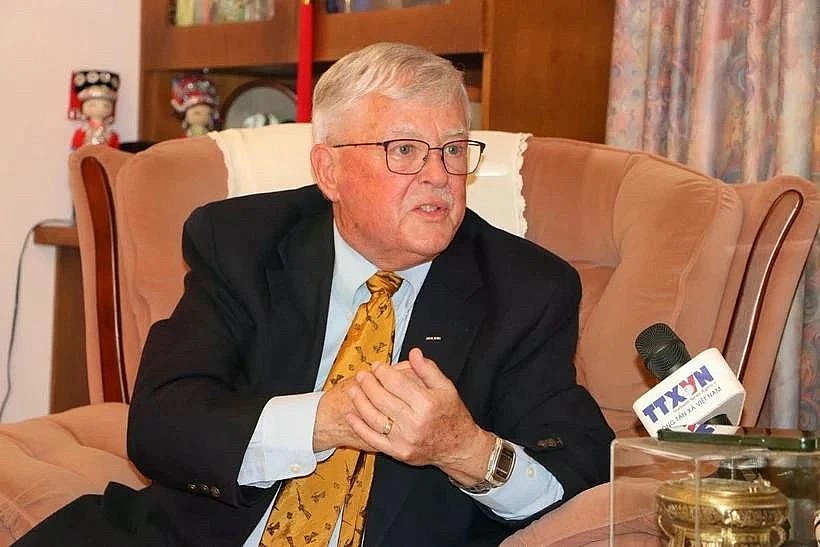 |
| Professor Carl Thayer of the Australian Defence Force Academy under the University of New South Wales (Photo: VNA) |
Vietnam acquitted international prestige as a reliable partner through its pursuit of independence, self-reliance, peace, cooperation, and development, he added.
Vietnam’s leaders have often called for “combining national strength and the strength of the times.” During the struggle for national unification, Vietnam was able to receive assistance from traditional friends but also modify this assistance to suit the conditions of Vietnam. General Vo Nguyen Giap modified his strategy to defeat the French at Dien Bien Phu. Vietnam modified Soviet military technology to suit the battlefield conditions in Vietnam.
Today, Vietnam encourages technology transfer and co-production. As Vietnam’s second International Defence Expo illustrated in December 2024, Vietnam could modify and develop coastal missiles and drones to suit its special conditions. Vietnam has also acquired the knowledge and skills to manufacture computer chips and electric vehicles.
The country has sent its students far and wide to learn about the Fourth Industrial Revolution and new innovations in science and technology, digital transformation, e-commerce, and artificial intelligence. It is now using this knowledge to make a breakthrough in development and avoid the middle-income trap.
In the context of Vietnam's increasingly deep integration with the world economy, many lessons learnt from the April 30 victory need to be recognised and promoted. The most important lesson is, Thayer said, Vietnam must always be able to evaluate its own strengths and weaknesses while pursuing a long-term strategic vision. The country can learn from other countries, but it must always pursue its national interests. This requires unity among the population, political stability, constant adaptability and critical innovation.
Vietnam to showcase food, tourism, and craft products in Europe
A culture and tourism week to introduce Vietnamese food, tourism, and craft products will tour around several European cities this May, aiming to attract more foreign tourists to the country.
The event organized by the Hue municipal People’s Committee is to advertise Festival Hue 2025 and main activities relating to the National Tourism Year-Hue 2025 to Europe which is a traditional tourism market for Vietnam.
Paris (France), Milan (Italy), and Geneva (Switzerland) will be three venues of the culture and tourism week slated to run from May 3 to 14.
Tourism promotion activities abroad will feature a diverse range of events, including Businesses-to-Business (B2B) meetings; traditional art performances; programs to introduce traditional Vietnamese craft villages; performances of Hue royal cuisine; and exchanges between Vietnamese travel agencies and their partners in France, Italy, and Switzerland, cited VOV.
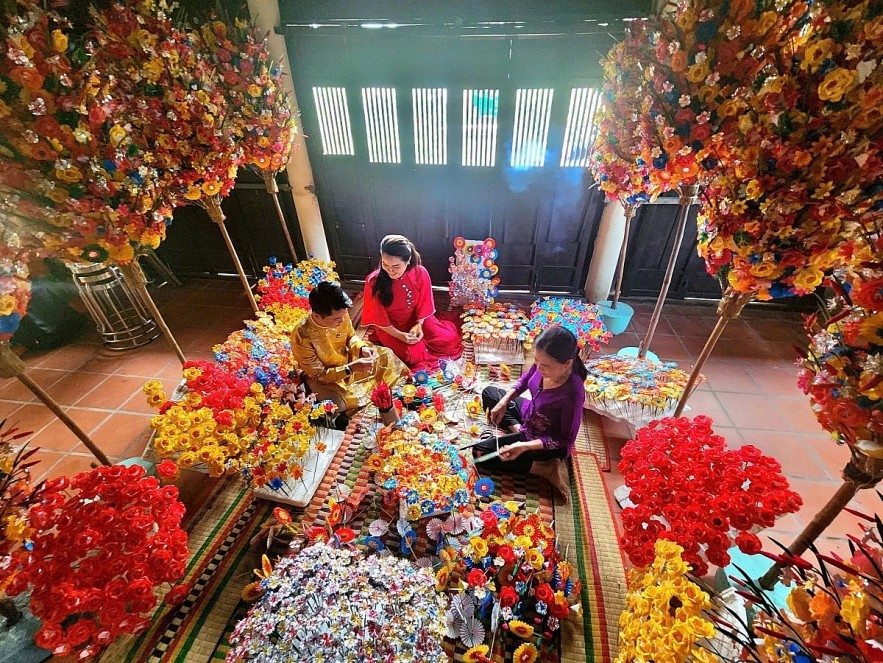 |
| Paper flower products in Thua Thien-Hue province's Thanh Tien craft village will be introduced in Europe this May. (Photo courtesy of the Ministry of Culture, Sports and Tourism) |
In particular, Vietnamese travel agents will focus on introducing the development situation, policies, tourism products, and services of Vietnam to international friends.
Furthermore, the unique culture of Hue city such as Ao Dai (traditional long dress), festivals, and royal cuisine will be promoted to foreign visitors through fashion shows and booths put on throughout the week.
Fireworks to light up Ho Chi Minh City skies on April 30
Ho Chi Minh City will organize fireworks displays at 30 locations on the evening of April 30 to mark the 50th anniversary of the liberation of the South and national reunification (April 30, 1975–2025).
Specifically, fireworks displays are scheduled to take place from 9:00 p.m. to 9:15 p.m. at two high-altitude and 28 low-altitude locations across districts, towns and Thu Duc City.
The two high-altitude firework performances will take place at the Sai Gon River crossing tunnel area (in Thu Duc City) and Ben Duoc Memorial Temple (Cu Chi District).
Meanwhile, 28 low -level fireworks avenues include: Giong junction (Hoc Mon district); Ben venom memorial temple (Thu Duc City); Memorial Memorial Martyrs Sac (Can Gio District); An Phu Dong war zone (District 12); Lang Le Cultural Park (Binh Chanh District); Binh Tri Dong residential area (Binh Tan district); Thong Nhat Hall and Ba Son Bridge (District 1); Thanh Da peninsula (Binh Thanh district); Tan Thuan Bridge (District 4); North West Industrial Park (Cu Chi District); Cultural Park in Go Vap District; People's Committee of Nha Be district; Administrative center of District 7; Dam Sen Cultural Park (District 11); Binh Dien Market (District 8); Resettlement area 38ha Tan Son Nhat (District 12); An Binh area (Tan Phu district); and Binh Phu Park (District 6).
In addition, some locations on barges in the Rach Chiec area, the Saigon River area, the Van Phuc Urban Area, and Ben Bach Dang wharf will host firework displays, VGP reported.
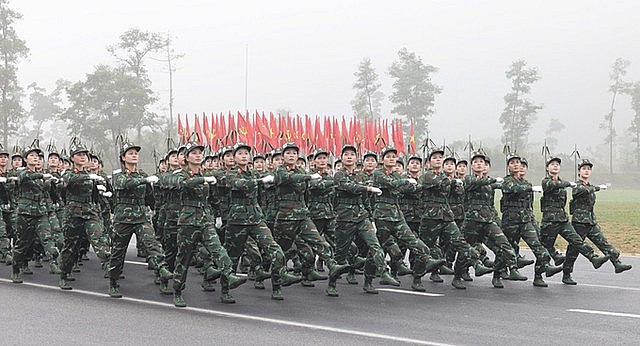 |
| The full dress rehearsals on Le Duan Street (HCMC) are scheduled on April 18 and 22. |
Ho Chi Minh City also organizes high-altitude fireworks displays for two consecutive Saturday evenings (April 19 and April 26) to serve people and tourists. The shooting time is from 9:30 p.m. to 9:40 p.m. at Sai Gon Riverside Park (Thu Duc City).
The national-level celebration and a military-civilian parade celebrating the 50th anniversary of the liberation of the South and national reunification (April 30, 1975 – 2025) will begin at 6:30 am on April 30 along Le Duan Street and key city routes in the southern metropolis.
The ceremony will feature a 30-minute art performance, flag-saluting, speeches by top leaders and representatives of war veterans and young people. It will be followed by the parade and a symbolic release of balloons and doves.
Joint drills for the armed forces will be held on April 11 and 15 at Air Regiment 935 in Bien Hoa City. Full-dress rehearsals for the military parade are set for April 18 and 22 along Le Duan Street in downtown HCMC. These are being directed by the General Staff of the Vietnam People's Army.
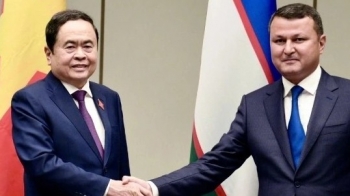 | Vietnam News Today (Apr. 8): Vietnam Wishes for Stronger All-Round Cooperation with Uzbekistan Vietnam News Today (Apr. 8): Vietnam wishes for stronger all-round cooperation with Uzbekistan; Vietnamese community in Japan strengthens bonds among members; Standard Chartered projects strong ... |
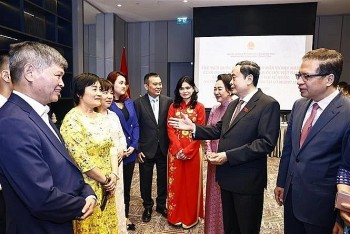 | Vietnam News Today (Apr. 9): Top legislator meets with Vietnamese community in Uzbekistan; 2025 P4G Summit in Hanoi to spotlight green transition; Japan highlights Vietnam’s ... |
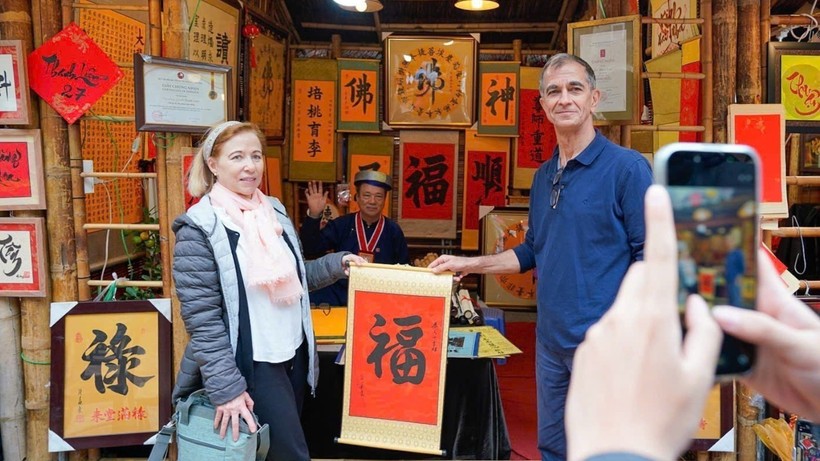 National
National
Vietnam News Today (Feb. 25): Tet Tourism Season Sees Strong Nationwide Growth
Recommended
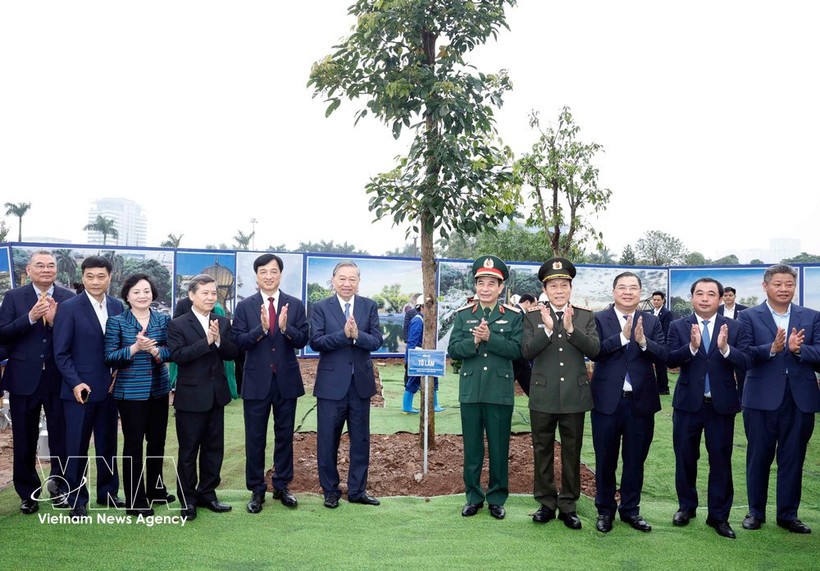 National
National
Party Leader Attends Launch of Tree Planting Festival in Hanoi
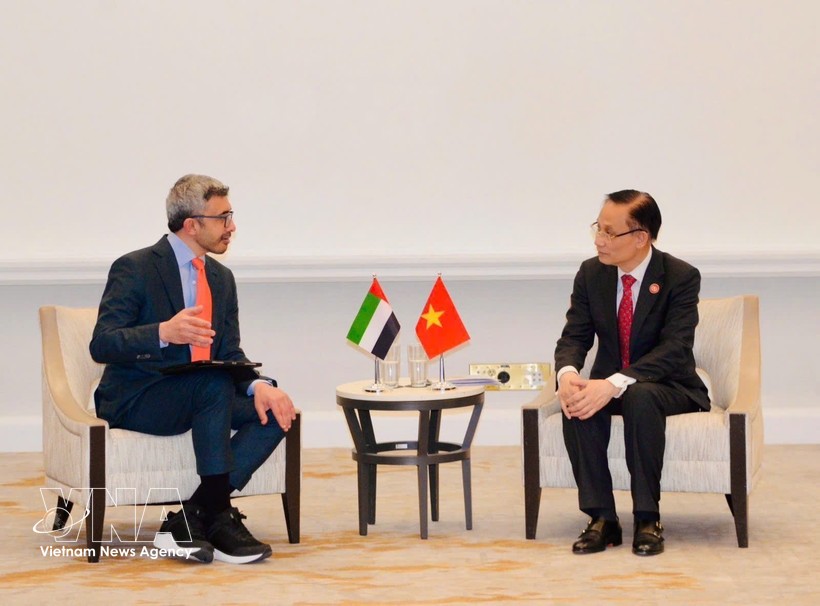 National
National
Vietnam News Today (Feb. 22): Vietnamese FM Meets Counterparts of UAE, Egypt and Türkiye
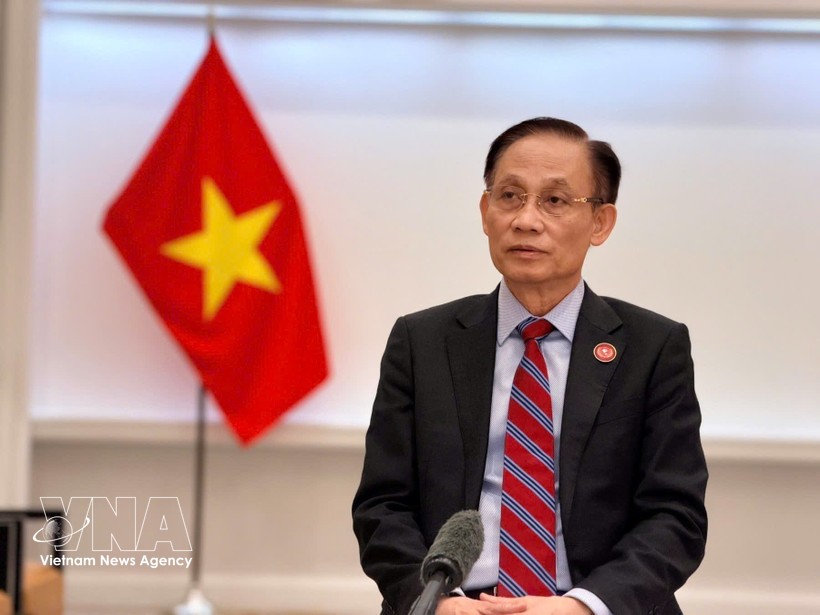 National
National
Party Chief’s US Trip Marks Milestone in High-level Multilateral Diplomacy: FM
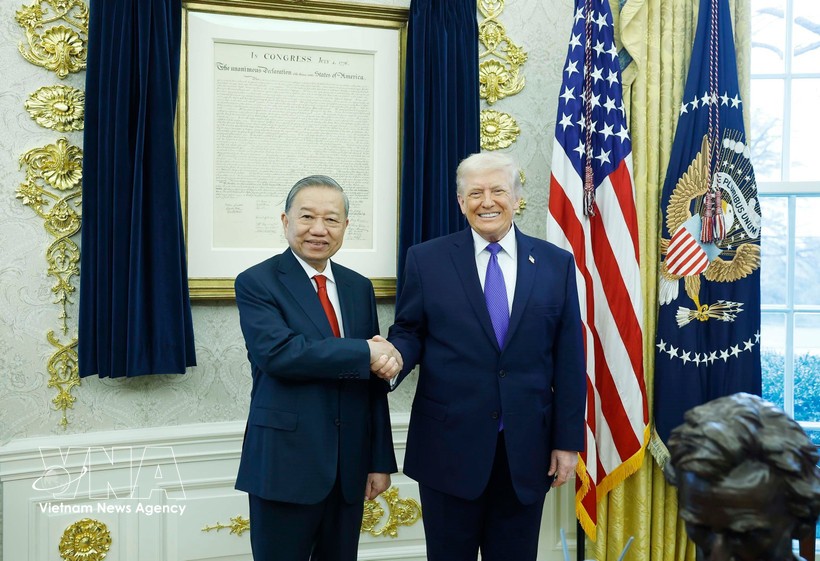 National
National
Party General Secretary To Lam Meets US President Donald Trump at White House
 National
National
Vietnam News Today (Feb. 25): Tet Tourism Season Sees Strong Nationwide Growth
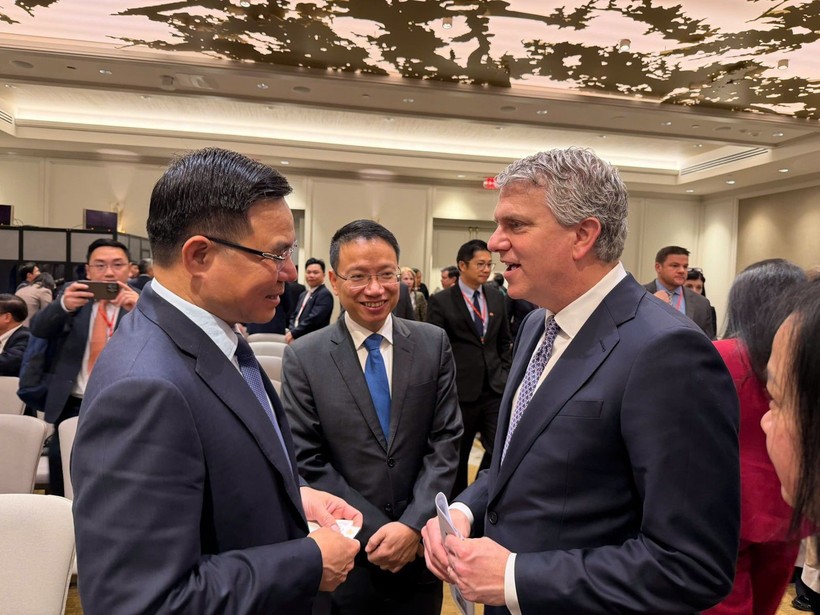 National
National
Vietnam News Today (Feb. 21): Vietnam, US Step Up Dialogue to Facilitate Trade Ties
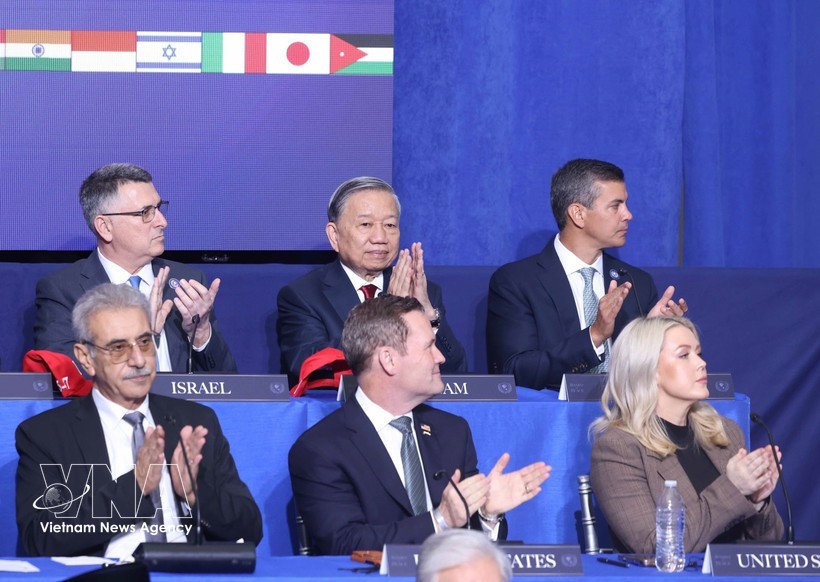 National
National
Party General Secretary To Lam Attends Inaugural Meeting of Gaza Board of Peace in US
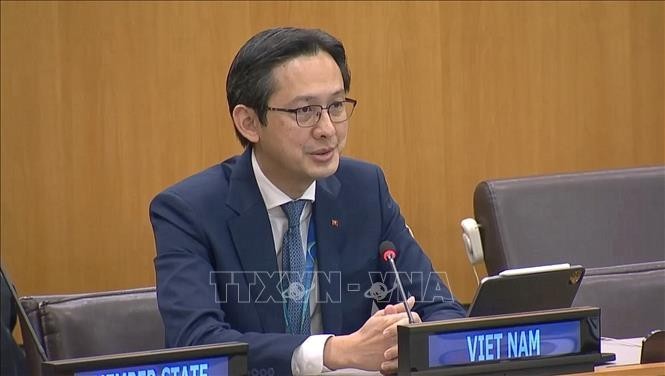 National
National

